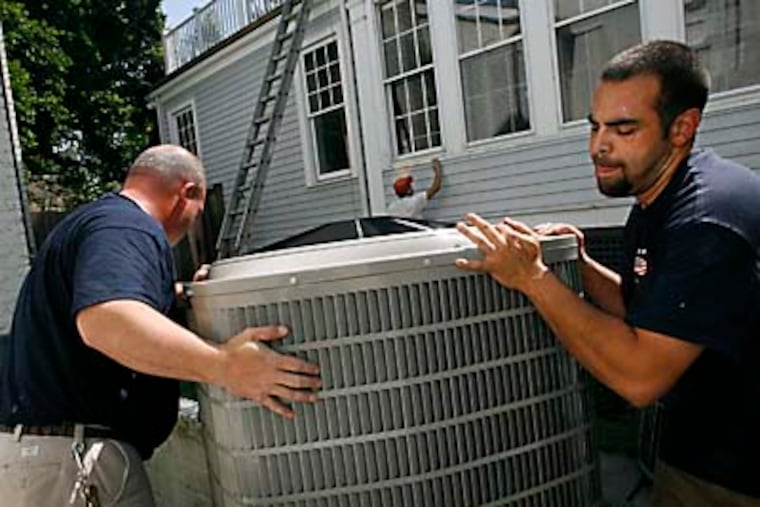What you should do now to prep your AC for the next heat wave
Get repairs or replacements done now. "If it’s a mild week, that’s the best time to do it because the companies are slower," said one local expert .

With last week’s heat wave behind us and temperatures relatively mild for August, the strength of your air conditioner — and your gratitude for its existence — may no longer be top of mind.
But now is actually the time you should be thinking about it, local air conditioner experts say.
If your system needs an annual tune-up, you should make that appointment ASAP, as technicians can get busy during heat waves.
“If it’s a mild week, that’s the best time to do it because the companies are slower,” said Desmond Chisholm, owner of Desmond Heating & Cooling, which operates in Philadelphia, its suburbs, and Delaware. “If I got 100-degree weather, I’m going to tend to my customers that have emergency calls,” not routine maintenance.
» READ MORE: ‘That house was like an oven’: How residents of Philly’s hottest neighborhoods are coping as temperatures rise
Summers having been getting hotter across the U.S., putting the health risks of extreme heat on display and laying bare the racial and socioeconomic disparities that impact who gets to stay cool.
If you are fortunate enough to be able to afford an air-conditioned home, here are some other steps you should take now to prep for the next stretch of super hot days.
Check your filter
“The main thing you should do is make sure you have a clean filter,” said Aldo Tagliaferro, owner of Andrews Heating and Air in Camden County. “That is more important than anything.”
In order to do this, homeowners should remove their unit’s filter, which may be on the side or the top.
If you don’t do this regularly, “you’ll have bad air flow and the system will freeze up,” Tagliaferro added. “It will turn into a block of ice because not enough air will cross the coils.”
As a rule of thumb, change your filter at least every three months. And Tagliaferro and other technicians said don’t feel like you need to splurge on thicker filters, which may make your unit run less efficiently.
“A lot of people are caught up in the more expensive filter,” said Hakeem Steed, owner of Steed HVAC, which is based in West Philadelphia and operates in the city, as well as Delaware and Montgomery Counties. “I always recommend to my customers a thinner filter.”
Clean the coils
Wash off the outside portion of your air conditioner.
“Clean the coils, the outside coils on the condenser, with a hose, on a spray mode,” Tagliaferro said.
Watch out for water
Check the condensate drain line, which runs through the central AC system to the outside. A clogged drain line can impact your AC’s efficiency and lifespan.
The drain line may be clogged if there is standing or dripping water, a clear sign your unit needs maintenance.
Look for signs of a dying AC
According to technicians, signs that your AC that may be on its last leg can include:
It not cooling off the house as quickly and efficiently as it once did
Ice on the refrigerant lines, which connect the outdoor portion of your AC to the inside
Poor or no air flow from vents, a sign that the blow motors aren’t working efficiently
The outdoor unit is dirty or contains rust
Higher than usual energy bills
Replace old window units
If you rely on old window units and they aren’t running properly, now would be the time to invest in replacements.
“It’ll probably cost you more money to have somebody come out,” Steed said. “That is a situation where you’d just replace.”
Keep up on maintenance
For central AC or duct-less units, like mini-splits, you should be scheduling annual maintenance.
Technicians say the best time to do that is before the summer. But if you haven’t done it yet this year, sooner is better than later.
“Call a professional,” Steed said. “Get somebody to look at the unit if you need it cleaned and serviced. If it’s not in perfect running condition, the unit will fail prematurely, or it will go out on you on the hottest day.”
“The units work a lot harder when it is hot,” Chisholm said. But “maintenance is the key because you want to know where where it’s at. … A lot of people just run [their AC] until it actually fails.”
Technicians suggest you not be one of them.